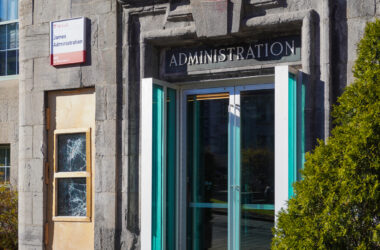McGill’s Office of the Budget held a town hall on Oct. 25 to discuss the McGill budget for the 2017 fiscal year, explain how it was created, and allow the public to ask questions and give their input about what they would like to see included as the budget is finalized in April 2017. The meeting was hosted by Provost and Vice-Principal (Academic) Christopher Manfredi. According to Manfredi, these town halls are usually held during a financial crisis, but McGill is currently financially stable, making this town hall an exception to this rule.
“I thought it would be good to have a broader kind of conversation about the budget, and also to have an opportunity outside of the crisis period to hear some things that are on [the public’s] minds as to what we should be thinking about as we produce the university’s budget,” Manfredi said.
The town hall was divided between a presentation by Manfredi and a question-and-answer period. Manfredi began his presentation by discussing the operating fund, which covers McGill’s daily revenues and expenditures. Manfredi provided a quick overview of the revenues that contribute to the operating budget, and then went into detail about McGill’s specific operating costs.
“About three quarters of our operating revenue is determined by student enrolment,” Manfredi said. “Student enrolment determines our government grant, and […] determines how much we collect in tuition fees.”
Manfredi also presented on McGill’s budget planning agreements, which are the outcome of a series of meetings between the Office of the Budget and representatives from different faculties and administrative units. These agreements are an important part of the creation of the Financial & Budget Model (FBM), McGill’s multi-year budget plan. The agreements will create funding plans for temporary and continuing projects for the the next three years. Associate Provost (Budget and Resources) Ghyslaine McClure explained in an email to The McGill Tribune that she will deal directly with approving these projects.
“All the approved financial requests are communicated to [my office],” McClure wrote. “[We then work] with the Budget Office to include them in the FBM.”
The meetings bring together 23 units from faculties and the administration to talk about their financial and educational priorities. It is a five month process that will conclude in December.
“[This process includes] accountability reporting on the activities of the previous year, talking about what needs to be done going forward, and then there’s an iterative exchange to develop an incremental budget for the following three fiscal years,” said Manfredi. “The budget that we’ll get next year is really a function of the budget we have this year.”
Josephine Nalbantoglu, dean of Graduate Studies, found the town hall to be very educational. Representing the financial and educational objectives of graduate and postdoctoral studies, Nalbantoglu is a member of one of the units working with the Office of the Budget to prepare a budget planning agreement.
“I didn’t know what was involved with the process, and how the numbers are crunched together, and how priorities are determined,” Nalbantoglu said.
In her role representing graduate and postdoctoral studies in the creation of the FBM, Nalbantoglu has direct influence on how the budget is planned.
“I have to prepare my own agreement for graduate studies,” Nalbantoglu said. “My role in the agreement process is to look over the landscape and see what we need for graduate studies. So, I’m basically supporting graduate studies and advocating for graduate studies, trying to get enough resources to make funding better, […] to recruit the best students, and to give them better services.”
According to Manfredi, the budget is not cause for concern as its current stability will allow the administration to better plan for the future.
“I’ll end with some optimistic words,” Manfredi said. “These town halls were often done in the context of a budget crisis, a revenue crisis, and I don’t think we’re there. I won’t say that we’re in a period of major growth, but I think we’re in a period of budgetary stability which will allow us to […] make sure that our decisions are driven, really, by our actual priorities that we want to pursue as opposed to responding reactively to external shocks.”
The administrative and faculty units will complete their agreements by January 2017, and this will be a finalizing step for the FBM.









